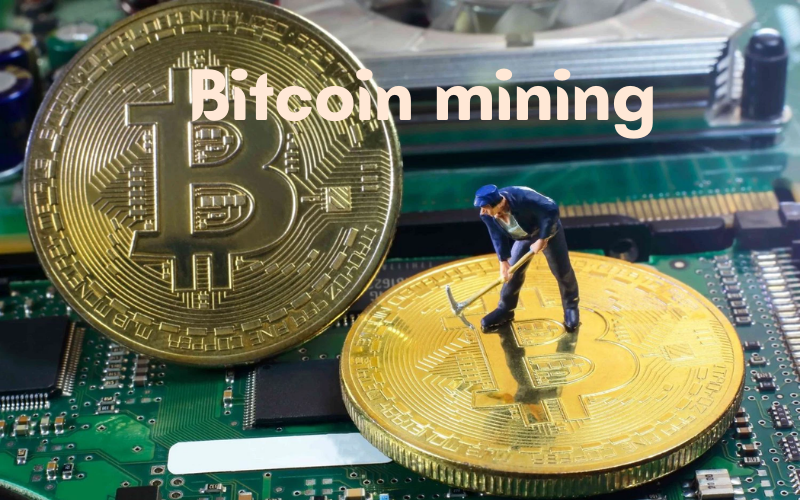If you have an interest in Bitcoin, you can learn more about the term “bitcoin mining”. However, the mining bitcoin market is quite harsh. Let’s learn the definition, and how to mine bitcoin. Is Bitcoin mining still an attractive market? Should new investors take part in this market?
What is Bitcoin mining?
Bitcoin mining is the process by which new bitcoins are entered into circulation. It is also the way the network confirms new transactions and is a critical component of the blockchain ledger’s maintenance and development. “Mining” is performed using sophisticated hardware that solves an extremely complex computational math problem. The first computer to find the solution to the problem receives the next block of bitcoins and the process begins again.
Cryptocurrency mining is painstaking, costly, and only sporadically rewarding. Nonetheless, mining has a magnetic appeal for many investors who have an interest in cryptocurrency because of the fact that miners receive rewards for their work with crypto tokens. This may be because entrepreneurial types see mining as pennies from heaven, like California gold prospectors in 1849.
The bitcoin reward that miners receive is an incentive that motivates people to assist in the primary purpose of mining: to legitimize and monitor Bitcoin transactions, ensuring their validity. Because many users all over the world share these responsibilities, Bitcoin is a “decentralized” cryptocurrency, or one that does not rely on any central authority like a central bank or government to oversee its regulation.
Alt: What is Bitcoin mining?
How does Bitcoin mining work?
Mining (blockchain mining, in general) leverages economic incentives to provide a reliable and trustless way of ordering data. The third parties ordering transactions are decentralized, and they receive monetary rewards for correct behavior. On the contrary, any misbehavior results in a loss of economic resources; at least as long as the majority remains honest.
In the case of BTC mining, this result is achieved by creating a succession of blocks that can be mathematically proven to have been stacked in the correct order with a certain commitment of resources. The process hinges on the mathematical properties of a cryptographic hash – a way to encode data in a standardized manner.
Hashes are a one-way encryption tool; meaning that decrypting them to their input data is nearly impossible unless every possible combination is tested until the result matches the given hash.
Miners generate the hash – as an identifier for any particular block; and compose the data found in the block header. The most important components of the hash are the Merkle root; another aggregated hash that encapsulates the signatures of all transactions in that block and the previous block’s unique hash.
This means that altering even the tiniest component of a block would noticeably change its expected hash and that of every following block, too. Nodes would instantly reject this incorrect version of the blockchain, protecting the network from tampering.
Alt: How does it work?
Why mine Bitcoin?
In many aspects, BTC mining is comparable to mining for gold. Crypto mining (in Bitcoin’s case) is a computer operation that creates new BTC; and tracks transactions and ownership of the cryptocurrency. Bitcoin and gold mining are both energy-intensive and can produce significant financial rewards.
Therefore, you can mine BTC to earn profit/rewards. Some BTC miners build Bitcoin mining pools by combining their efforts with other miners. Groups of miners who work together have a more significant chance of earning rewards and splitting the profits. In addition, members of a mining pool pay a fee to be a part of the pool.
If your focus is not on money, you might want to mine BTC if you enjoy playing with computers and learning about this new technology. For example, while doing Bitcoin mining configuration, you can learn how your computer and blockchain-based networks work.
Is Bitcoin mining worth it?
To find an anTo find an answer to the above question, please conduct a cost-benefit analysis (using web-based calculators) to see whether Bitcoin mining is worth your effort. A cost-benefit analysis is a systematic method that organizations use to determine which actions need undertaking and which should avoiding.
First, determine whether you are willing to invest the required initial capital in hardware; and determine the future value of Bitcoin and the level of difficulty before committing your resources. It’s also crucial to examine the amount of difficulty specific to the cryptocurrency; you wish to mine to see if the mining operation would be even lucrative.
When both bitcoin prices and mining difficulty fall; it usually means fewer miners are mining BTC; and acquiring BTC is easier. Nonetheless, expect more miners to compete for fewer BTC as Bitcoin prices and mining difficulty climb.
Is Bitcoin mining legal?
If you’re wondering whether Bitcoin mining is legal — the answer is yes, considering the acceptance by various jurisdictions. For example, Enigma (based in Iceland) opened one of the world’s most extensive Bitcoin mining operations.
Crypto mining is a business in Israel and is subject to corporate income tax. On the other hand, crypto miners are people who transmit money by the Financial Crimes Enforcement Network (FinCEN) in the United States; meaning they may be subject to the rules that govern that conduct.
In addition, near the base of the Colchagua volcano; a new “Bitcoin city” will be built in the shape of a coin, as announced by El Salvador’s President Nayib Bukele in November 2021. El Salvador will raise a billion-dollar “Bitcoin bond” with the help of crypto infrastructure provider Blockstream to commence construction of the city.
However, Bitcoin mining prohibits in Algeria, Nepal, Russia, Bolivia, Egypt, Morocco, Ecuador, and Pakistan. You should always check local rules where you live to find out if Bitcoin mining is legal in your jurisdiction.

